Healthcare Policy Analysis: Reforms, Ideologies, and Impact on Users
VerifiedAdded on 2023/01/09
|9
|2605
|84
Report
AI Summary
This report provides an overview of healthcare policy in the United Kingdom, covering reforms introduced by the Labour government (1997-2010) and the Conservative/Liberal coalition (2010-2015). It examines key policy changes, such as the restructuring of NHS authorities, the introduction of the NHS plan, and the impact of these changes on service users. The report also delves into recent proposals in healthcare policy, the ideological backgrounds that influence policy development (including liberalism, multiculturalism, and socialism), and how stakeholders affect policy. Furthermore, it discusses specific policies developed during the coalition government and their impact on service users, along with government policies supporting individuals with long-term conditions. The report concludes by highlighting the implications of these policies on healthcare service delivery and the patient experience.
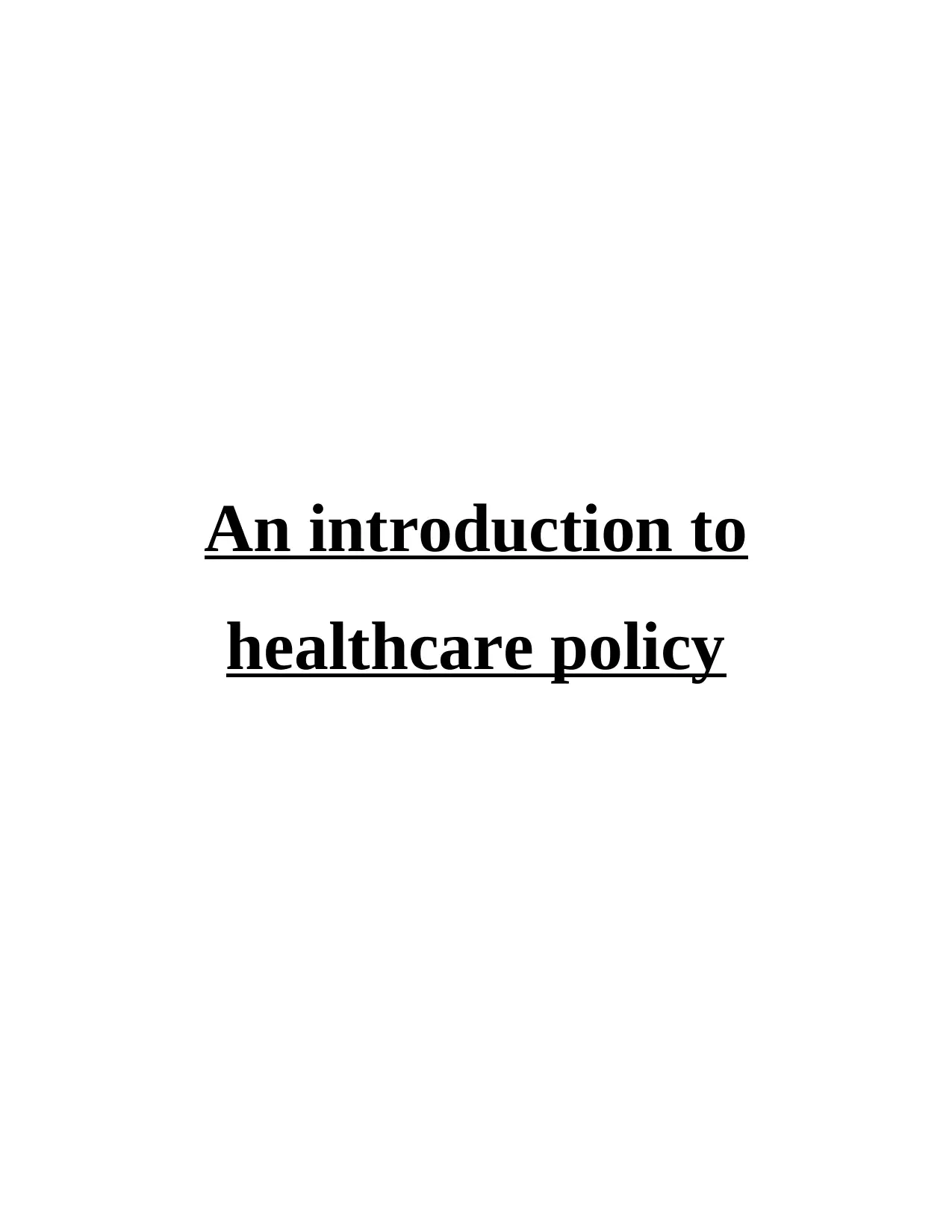
An introduction to
healthcare policy
healthcare policy
Paraphrase This Document
Need a fresh take? Get an instant paraphrase of this document with our AI Paraphraser
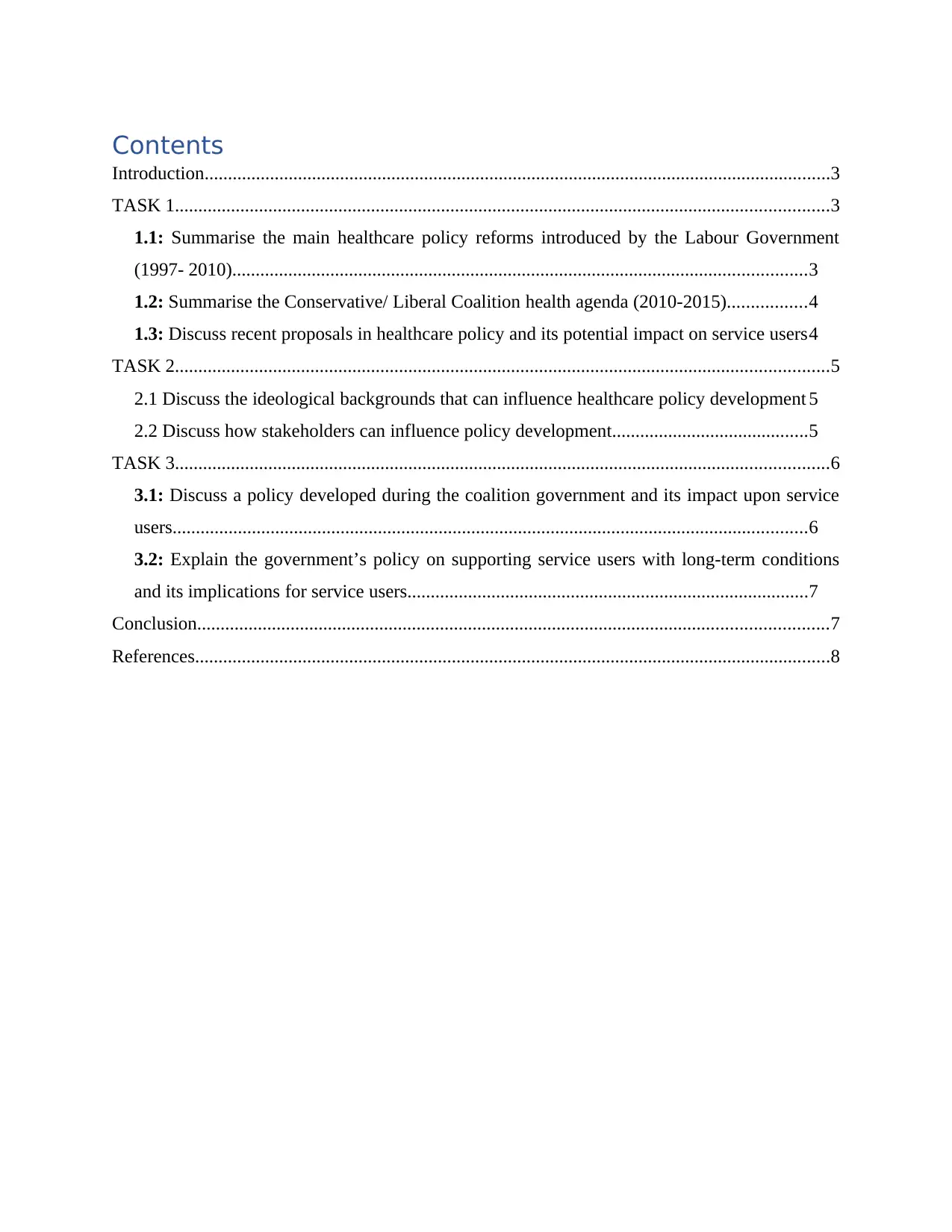
Contents
Introduction......................................................................................................................................3
TASK 1............................................................................................................................................3
1.1: Summarise the main healthcare policy reforms introduced by the Labour Government
(1997- 2010)...........................................................................................................................3
1.2: Summarise the Conservative/ Liberal Coalition health agenda (2010-2015).................4
1.3: Discuss recent proposals in healthcare policy and its potential impact on service users4
TASK 2............................................................................................................................................5
2.1 Discuss the ideological backgrounds that can influence healthcare policy development 5
2.2 Discuss how stakeholders can influence policy development..........................................5
TASK 3............................................................................................................................................6
3.1: Discuss a policy developed during the coalition government and its impact upon service
users........................................................................................................................................6
3.2: Explain the government’s policy on supporting service users with long-term conditions
and its implications for service users......................................................................................7
Conclusion.......................................................................................................................................7
References........................................................................................................................................8
Introduction......................................................................................................................................3
TASK 1............................................................................................................................................3
1.1: Summarise the main healthcare policy reforms introduced by the Labour Government
(1997- 2010)...........................................................................................................................3
1.2: Summarise the Conservative/ Liberal Coalition health agenda (2010-2015).................4
1.3: Discuss recent proposals in healthcare policy and its potential impact on service users4
TASK 2............................................................................................................................................5
2.1 Discuss the ideological backgrounds that can influence healthcare policy development 5
2.2 Discuss how stakeholders can influence policy development..........................................5
TASK 3............................................................................................................................................6
3.1: Discuss a policy developed during the coalition government and its impact upon service
users........................................................................................................................................6
3.2: Explain the government’s policy on supporting service users with long-term conditions
and its implications for service users......................................................................................7
Conclusion.......................................................................................................................................7
References........................................................................................................................................8
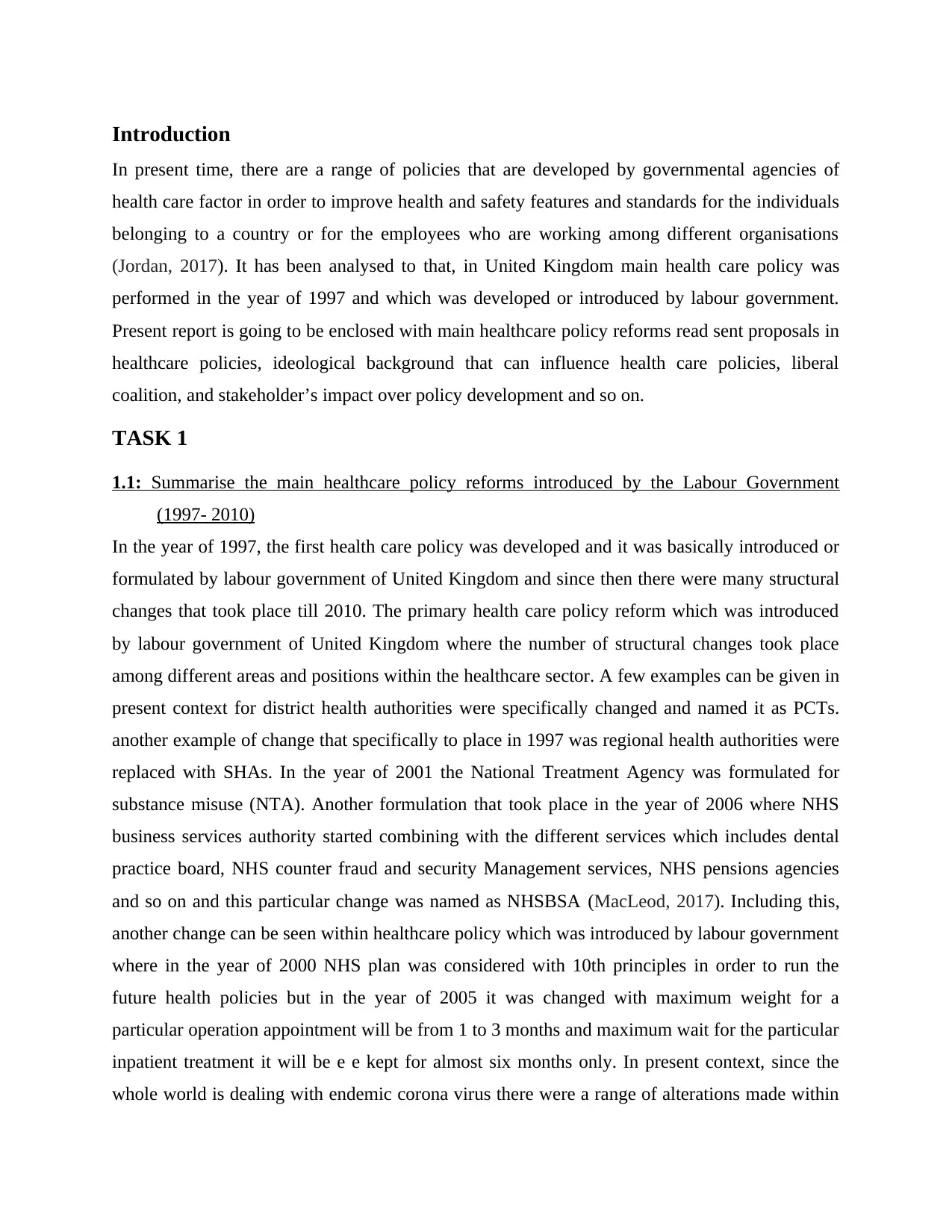
Introduction
In present time, there are a range of policies that are developed by governmental agencies of
health care factor in order to improve health and safety features and standards for the individuals
belonging to a country or for the employees who are working among different organisations
(Jordan, 2017). It has been analysed to that, in United Kingdom main health care policy was
performed in the year of 1997 and which was developed or introduced by labour government.
Present report is going to be enclosed with main healthcare policy reforms read sent proposals in
healthcare policies, ideological background that can influence health care policies, liberal
coalition, and stakeholder’s impact over policy development and so on.
TASK 1
1.1: Summarise the main healthcare policy reforms introduced by the Labour Government
(1997- 2010)
In the year of 1997, the first health care policy was developed and it was basically introduced or
formulated by labour government of United Kingdom and since then there were many structural
changes that took place till 2010. The primary health care policy reform which was introduced
by labour government of United Kingdom where the number of structural changes took place
among different areas and positions within the healthcare sector. A few examples can be given in
present context for district health authorities were specifically changed and named it as PCTs.
another example of change that specifically to place in 1997 was regional health authorities were
replaced with SHAs. In the year of 2001 the National Treatment Agency was formulated for
substance misuse (NTA). Another formulation that took place in the year of 2006 where NHS
business services authority started combining with the different services which includes dental
practice board, NHS counter fraud and security Management services, NHS pensions agencies
and so on and this particular change was named as NHSBSA (MacLeod, 2017). Including this,
another change can be seen within healthcare policy which was introduced by labour government
where in the year of 2000 NHS plan was considered with 10th principles in order to run the
future health policies but in the year of 2005 it was changed with maximum weight for a
particular operation appointment will be from 1 to 3 months and maximum wait for the particular
inpatient treatment it will be e e kept for almost six months only. In present context, since the
whole world is dealing with endemic corona virus there were a range of alterations made within
In present time, there are a range of policies that are developed by governmental agencies of
health care factor in order to improve health and safety features and standards for the individuals
belonging to a country or for the employees who are working among different organisations
(Jordan, 2017). It has been analysed to that, in United Kingdom main health care policy was
performed in the year of 1997 and which was developed or introduced by labour government.
Present report is going to be enclosed with main healthcare policy reforms read sent proposals in
healthcare policies, ideological background that can influence health care policies, liberal
coalition, and stakeholder’s impact over policy development and so on.
TASK 1
1.1: Summarise the main healthcare policy reforms introduced by the Labour Government
(1997- 2010)
In the year of 1997, the first health care policy was developed and it was basically introduced or
formulated by labour government of United Kingdom and since then there were many structural
changes that took place till 2010. The primary health care policy reform which was introduced
by labour government of United Kingdom where the number of structural changes took place
among different areas and positions within the healthcare sector. A few examples can be given in
present context for district health authorities were specifically changed and named it as PCTs.
another example of change that specifically to place in 1997 was regional health authorities were
replaced with SHAs. In the year of 2001 the National Treatment Agency was formulated for
substance misuse (NTA). Another formulation that took place in the year of 2006 where NHS
business services authority started combining with the different services which includes dental
practice board, NHS counter fraud and security Management services, NHS pensions agencies
and so on and this particular change was named as NHSBSA (MacLeod, 2017). Including this,
another change can be seen within healthcare policy which was introduced by labour government
where in the year of 2000 NHS plan was considered with 10th principles in order to run the
future health policies but in the year of 2005 it was changed with maximum weight for a
particular operation appointment will be from 1 to 3 months and maximum wait for the particular
inpatient treatment it will be e e kept for almost six months only. In present context, since the
whole world is dealing with endemic corona virus there were a range of alterations made within
⊘ This is a preview!⊘
Do you want full access?
Subscribe today to unlock all pages.

Trusted by 1+ million students worldwide
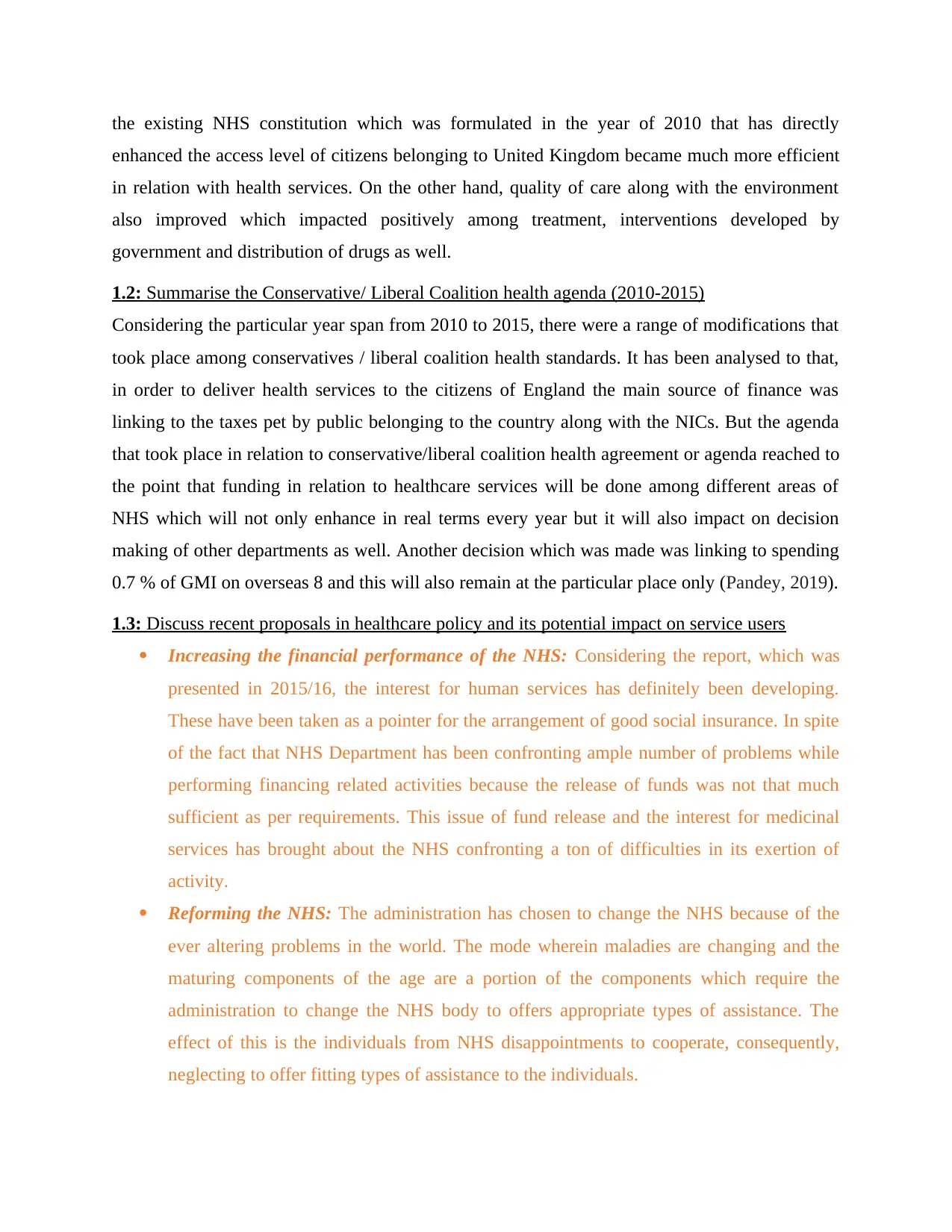
the existing NHS constitution which was formulated in the year of 2010 that has directly
enhanced the access level of citizens belonging to United Kingdom became much more efficient
in relation with health services. On the other hand, quality of care along with the environment
also improved which impacted positively among treatment, interventions developed by
government and distribution of drugs as well.
1.2: Summarise the Conservative/ Liberal Coalition health agenda (2010-2015)
Considering the particular year span from 2010 to 2015, there were a range of modifications that
took place among conservatives / liberal coalition health standards. It has been analysed to that,
in order to deliver health services to the citizens of England the main source of finance was
linking to the taxes pet by public belonging to the country along with the NICs. But the agenda
that took place in relation to conservative/liberal coalition health agreement or agenda reached to
the point that funding in relation to healthcare services will be done among different areas of
NHS which will not only enhance in real terms every year but it will also impact on decision
making of other departments as well. Another decision which was made was linking to spending
0.7 % of GMI on overseas 8 and this will also remain at the particular place only (Pandey, 2019).
1.3: Discuss recent proposals in healthcare policy and its potential impact on service users
Increasing the financial performance of the NHS: Considering the report, which was
presented in 2015/16, the interest for human services has definitely been developing.
These have been taken as a pointer for the arrangement of good social insurance. In spite
of the fact that NHS Department has been confronting ample number of problems while
performing financing related activities because the release of funds was not that much
sufficient as per requirements. This issue of fund release and the interest for medicinal
services has brought about the NHS confronting a ton of difficulties in its exertion of
activity.
Reforming the NHS: The administration has chosen to change the NHS because of the
ever altering problems in the world. The mode wherein maladies are changing and the
maturing components of the age are a portion of the components which require the
administration to change the NHS body to offers appropriate types of assistance. The
effect of this is the individuals from NHS disappointments to cooperate, consequently,
neglecting to offer fitting types of assistance to the individuals.
enhanced the access level of citizens belonging to United Kingdom became much more efficient
in relation with health services. On the other hand, quality of care along with the environment
also improved which impacted positively among treatment, interventions developed by
government and distribution of drugs as well.
1.2: Summarise the Conservative/ Liberal Coalition health agenda (2010-2015)
Considering the particular year span from 2010 to 2015, there were a range of modifications that
took place among conservatives / liberal coalition health standards. It has been analysed to that,
in order to deliver health services to the citizens of England the main source of finance was
linking to the taxes pet by public belonging to the country along with the NICs. But the agenda
that took place in relation to conservative/liberal coalition health agreement or agenda reached to
the point that funding in relation to healthcare services will be done among different areas of
NHS which will not only enhance in real terms every year but it will also impact on decision
making of other departments as well. Another decision which was made was linking to spending
0.7 % of GMI on overseas 8 and this will also remain at the particular place only (Pandey, 2019).
1.3: Discuss recent proposals in healthcare policy and its potential impact on service users
Increasing the financial performance of the NHS: Considering the report, which was
presented in 2015/16, the interest for human services has definitely been developing.
These have been taken as a pointer for the arrangement of good social insurance. In spite
of the fact that NHS Department has been confronting ample number of problems while
performing financing related activities because the release of funds was not that much
sufficient as per requirements. This issue of fund release and the interest for medicinal
services has brought about the NHS confronting a ton of difficulties in its exertion of
activity.
Reforming the NHS: The administration has chosen to change the NHS because of the
ever altering problems in the world. The mode wherein maladies are changing and the
maturing components of the age are a portion of the components which require the
administration to change the NHS body to offers appropriate types of assistance. The
effect of this is the individuals from NHS disappointments to cooperate, consequently,
neglecting to offer fitting types of assistance to the individuals.
Paraphrase This Document
Need a fresh take? Get an instant paraphrase of this document with our AI Paraphraser
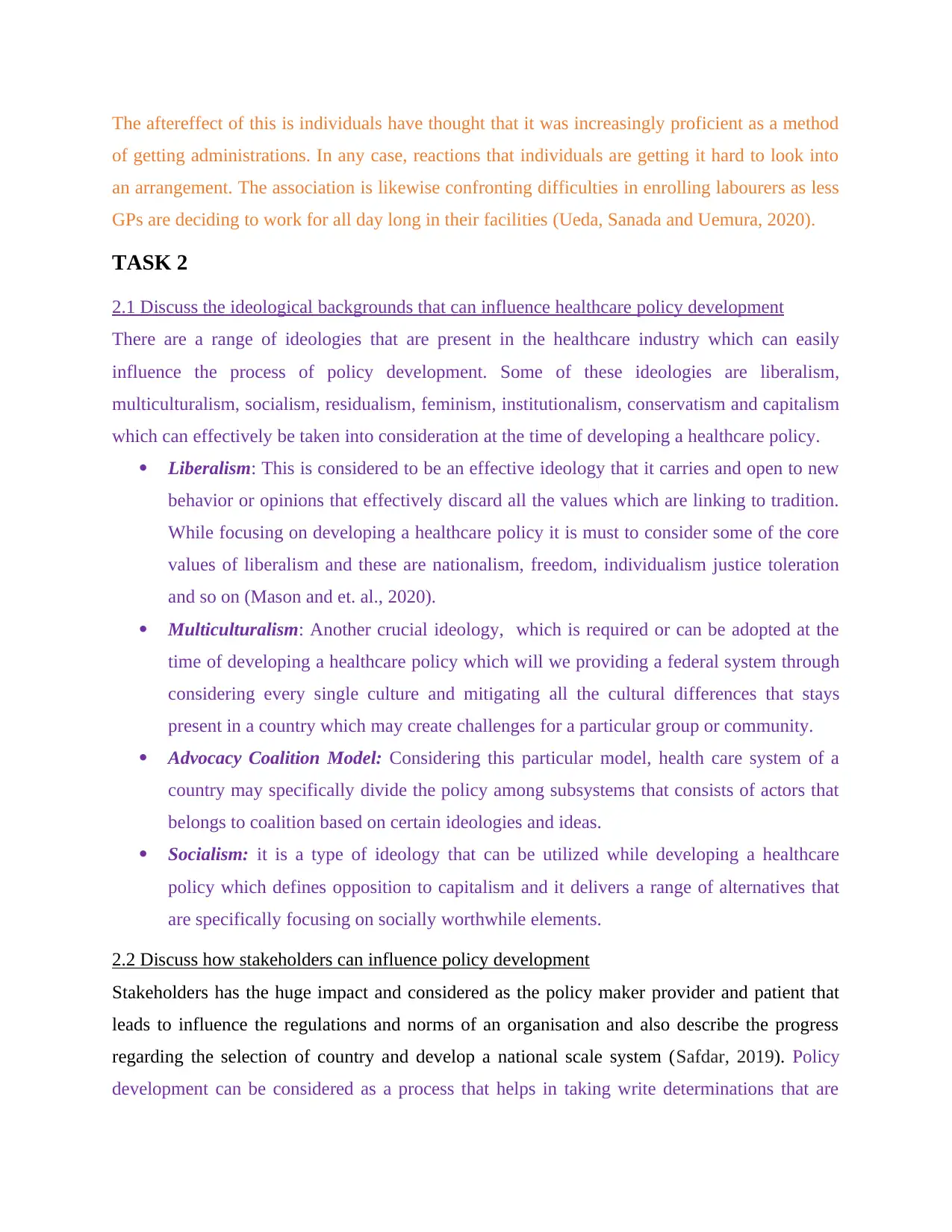
The aftereffect of this is individuals have thought that it was increasingly proficient as a method
of getting administrations. In any case, reactions that individuals are getting it hard to look into
an arrangement. The association is likewise confronting difficulties in enrolling labourers as less
GPs are deciding to work for all day long in their facilities (Ueda, Sanada and Uemura, 2020).
TASK 2
2.1 Discuss the ideological backgrounds that can influence healthcare policy development
There are a range of ideologies that are present in the healthcare industry which can easily
influence the process of policy development. Some of these ideologies are liberalism,
multiculturalism, socialism, residualism, feminism, institutionalism, conservatism and capitalism
which can effectively be taken into consideration at the time of developing a healthcare policy.
Liberalism: This is considered to be an effective ideology that it carries and open to new
behavior or opinions that effectively discard all the values which are linking to tradition.
While focusing on developing a healthcare policy it is must to consider some of the core
values of liberalism and these are nationalism, freedom, individualism justice toleration
and so on (Mason and et. al., 2020).
Multiculturalism: Another crucial ideology, which is required or can be adopted at the
time of developing a healthcare policy which will we providing a federal system through
considering every single culture and mitigating all the cultural differences that stays
present in a country which may create challenges for a particular group or community.
Advocacy Coalition Model: Considering this particular model, health care system of a
country may specifically divide the policy among subsystems that consists of actors that
belongs to coalition based on certain ideologies and ideas.
Socialism: it is a type of ideology that can be utilized while developing a healthcare
policy which defines opposition to capitalism and it delivers a range of alternatives that
are specifically focusing on socially worthwhile elements.
2.2 Discuss how stakeholders can influence policy development
Stakeholders has the huge impact and considered as the policy maker provider and patient that
leads to influence the regulations and norms of an organisation and also describe the progress
regarding the selection of country and develop a national scale system (Safdar, 2019). Policy
development can be considered as a process that helps in taking write determinations that are
of getting administrations. In any case, reactions that individuals are getting it hard to look into
an arrangement. The association is likewise confronting difficulties in enrolling labourers as less
GPs are deciding to work for all day long in their facilities (Ueda, Sanada and Uemura, 2020).
TASK 2
2.1 Discuss the ideological backgrounds that can influence healthcare policy development
There are a range of ideologies that are present in the healthcare industry which can easily
influence the process of policy development. Some of these ideologies are liberalism,
multiculturalism, socialism, residualism, feminism, institutionalism, conservatism and capitalism
which can effectively be taken into consideration at the time of developing a healthcare policy.
Liberalism: This is considered to be an effective ideology that it carries and open to new
behavior or opinions that effectively discard all the values which are linking to tradition.
While focusing on developing a healthcare policy it is must to consider some of the core
values of liberalism and these are nationalism, freedom, individualism justice toleration
and so on (Mason and et. al., 2020).
Multiculturalism: Another crucial ideology, which is required or can be adopted at the
time of developing a healthcare policy which will we providing a federal system through
considering every single culture and mitigating all the cultural differences that stays
present in a country which may create challenges for a particular group or community.
Advocacy Coalition Model: Considering this particular model, health care system of a
country may specifically divide the policy among subsystems that consists of actors that
belongs to coalition based on certain ideologies and ideas.
Socialism: it is a type of ideology that can be utilized while developing a healthcare
policy which defines opposition to capitalism and it delivers a range of alternatives that
are specifically focusing on socially worthwhile elements.
2.2 Discuss how stakeholders can influence policy development
Stakeholders has the huge impact and considered as the policy maker provider and patient that
leads to influence the regulations and norms of an organisation and also describe the progress
regarding the selection of country and develop a national scale system (Safdar, 2019). Policy
development can be considered as a process that helps in taking write determinations that are
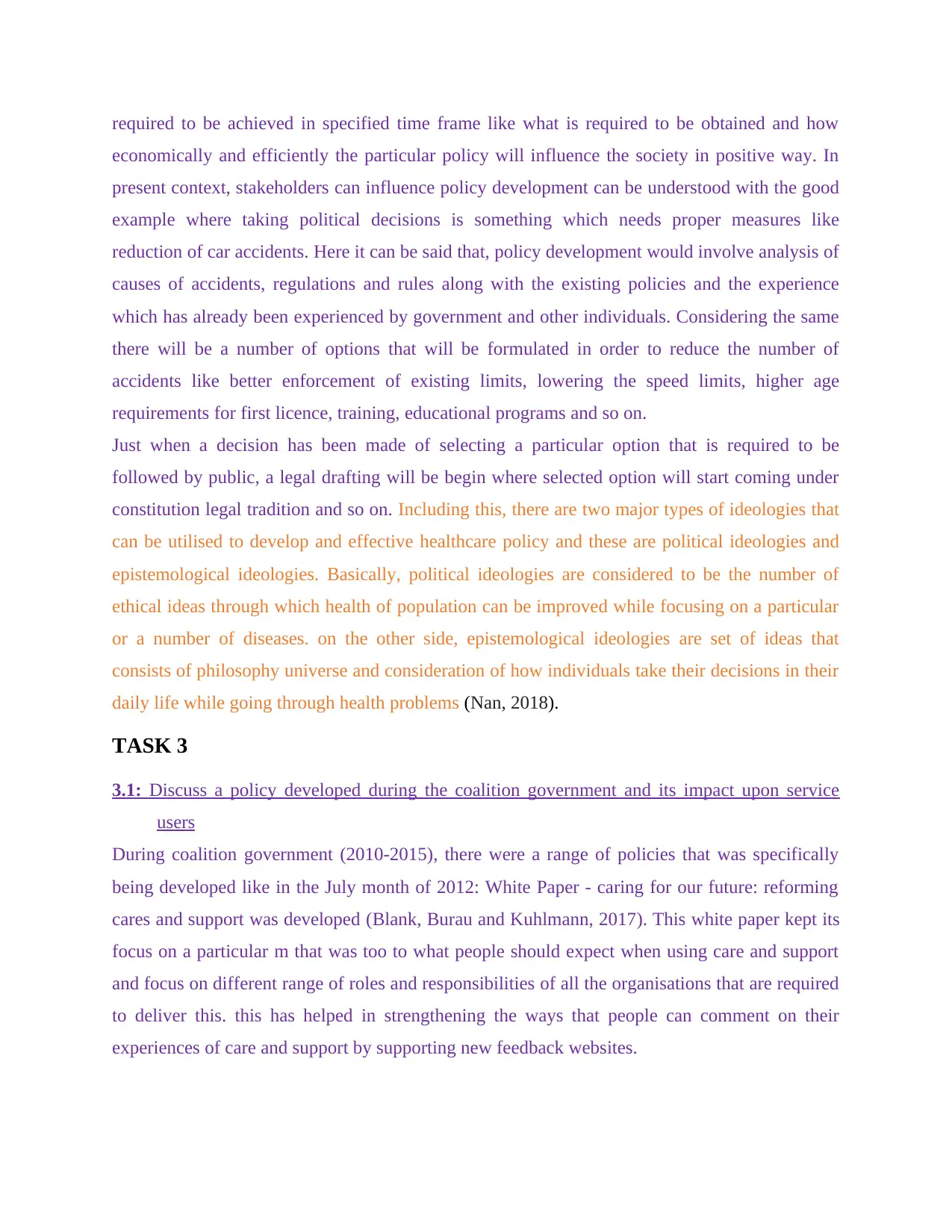
required to be achieved in specified time frame like what is required to be obtained and how
economically and efficiently the particular policy will influence the society in positive way. In
present context, stakeholders can influence policy development can be understood with the good
example where taking political decisions is something which needs proper measures like
reduction of car accidents. Here it can be said that, policy development would involve analysis of
causes of accidents, regulations and rules along with the existing policies and the experience
which has already been experienced by government and other individuals. Considering the same
there will be a number of options that will be formulated in order to reduce the number of
accidents like better enforcement of existing limits, lowering the speed limits, higher age
requirements for first licence, training, educational programs and so on.
Just when a decision has been made of selecting a particular option that is required to be
followed by public, a legal drafting will be begin where selected option will start coming under
constitution legal tradition and so on. Including this, there are two major types of ideologies that
can be utilised to develop and effective healthcare policy and these are political ideologies and
epistemological ideologies. Basically, political ideologies are considered to be the number of
ethical ideas through which health of population can be improved while focusing on a particular
or a number of diseases. on the other side, epistemological ideologies are set of ideas that
consists of philosophy universe and consideration of how individuals take their decisions in their
daily life while going through health problems (Nan, 2018).
TASK 3
3.1: Discuss a policy developed during the coalition government and its impact upon service
users
During coalition government (2010-2015), there were a range of policies that was specifically
being developed like in the July month of 2012: White Paper - caring for our future: reforming
cares and support was developed (Blank, Burau and Kuhlmann, 2017). This white paper kept its
focus on a particular m that was too to what people should expect when using care and support
and focus on different range of roles and responsibilities of all the organisations that are required
to deliver this. this has helped in strengthening the ways that people can comment on their
experiences of care and support by supporting new feedback websites.
economically and efficiently the particular policy will influence the society in positive way. In
present context, stakeholders can influence policy development can be understood with the good
example where taking political decisions is something which needs proper measures like
reduction of car accidents. Here it can be said that, policy development would involve analysis of
causes of accidents, regulations and rules along with the existing policies and the experience
which has already been experienced by government and other individuals. Considering the same
there will be a number of options that will be formulated in order to reduce the number of
accidents like better enforcement of existing limits, lowering the speed limits, higher age
requirements for first licence, training, educational programs and so on.
Just when a decision has been made of selecting a particular option that is required to be
followed by public, a legal drafting will be begin where selected option will start coming under
constitution legal tradition and so on. Including this, there are two major types of ideologies that
can be utilised to develop and effective healthcare policy and these are political ideologies and
epistemological ideologies. Basically, political ideologies are considered to be the number of
ethical ideas through which health of population can be improved while focusing on a particular
or a number of diseases. on the other side, epistemological ideologies are set of ideas that
consists of philosophy universe and consideration of how individuals take their decisions in their
daily life while going through health problems (Nan, 2018).
TASK 3
3.1: Discuss a policy developed during the coalition government and its impact upon service
users
During coalition government (2010-2015), there were a range of policies that was specifically
being developed like in the July month of 2012: White Paper - caring for our future: reforming
cares and support was developed (Blank, Burau and Kuhlmann, 2017). This white paper kept its
focus on a particular m that was too to what people should expect when using care and support
and focus on different range of roles and responsibilities of all the organisations that are required
to deliver this. this has helped in strengthening the ways that people can comment on their
experiences of care and support by supporting new feedback websites.
⊘ This is a preview!⊘
Do you want full access?
Subscribe today to unlock all pages.

Trusted by 1+ million students worldwide
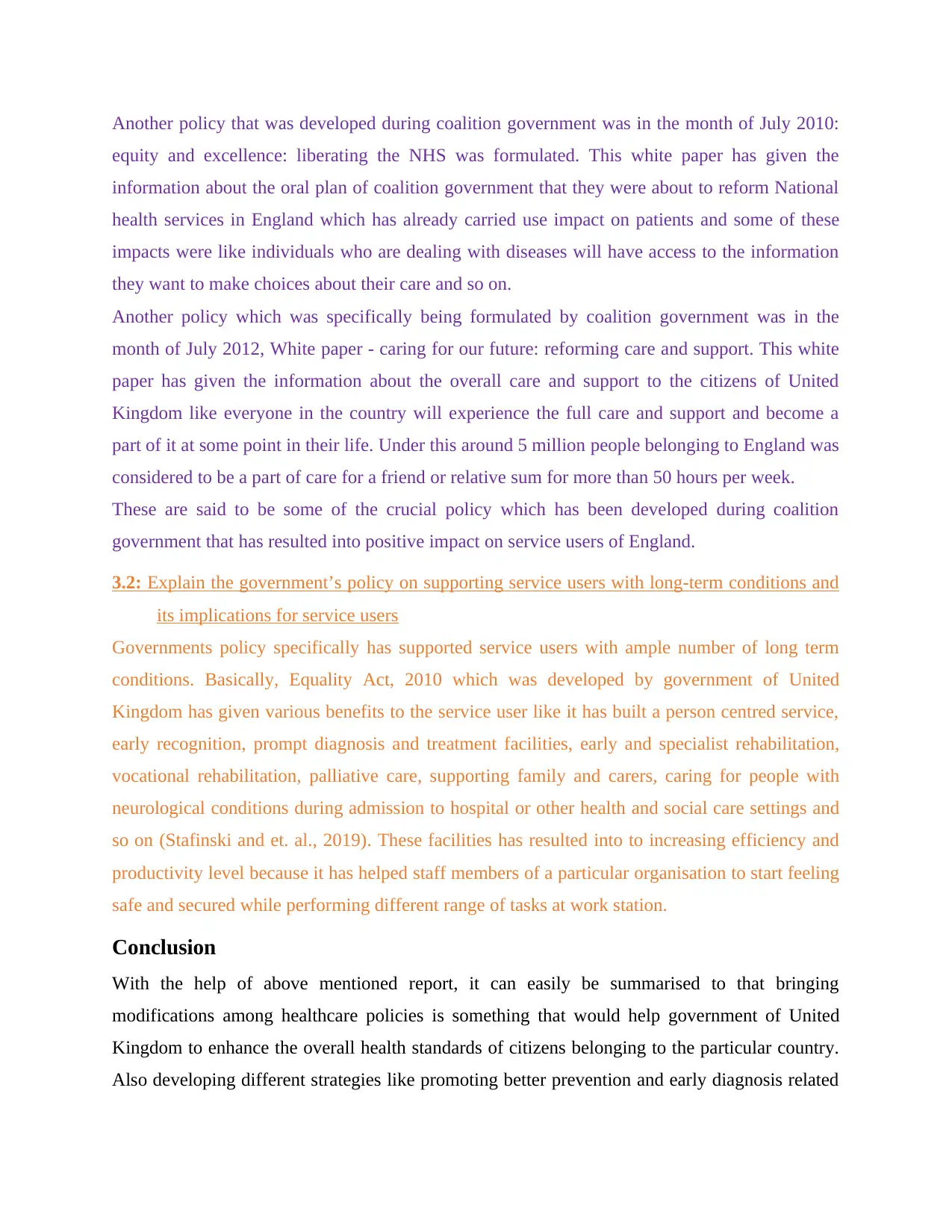
Another policy that was developed during coalition government was in the month of July 2010:
equity and excellence: liberating the NHS was formulated. This white paper has given the
information about the oral plan of coalition government that they were about to reform National
health services in England which has already carried use impact on patients and some of these
impacts were like individuals who are dealing with diseases will have access to the information
they want to make choices about their care and so on.
Another policy which was specifically being formulated by coalition government was in the
month of July 2012, White paper - caring for our future: reforming care and support. This white
paper has given the information about the overall care and support to the citizens of United
Kingdom like everyone in the country will experience the full care and support and become a
part of it at some point in their life. Under this around 5 million people belonging to England was
considered to be a part of care for a friend or relative sum for more than 50 hours per week.
These are said to be some of the crucial policy which has been developed during coalition
government that has resulted into positive impact on service users of England.
3.2: Explain the government’s policy on supporting service users with long-term conditions and
its implications for service users
Governments policy specifically has supported service users with ample number of long term
conditions. Basically, Equality Act, 2010 which was developed by government of United
Kingdom has given various benefits to the service user like it has built a person centred service,
early recognition, prompt diagnosis and treatment facilities, early and specialist rehabilitation,
vocational rehabilitation, palliative care, supporting family and carers, caring for people with
neurological conditions during admission to hospital or other health and social care settings and
so on (Stafinski and et. al., 2019). These facilities has resulted into to increasing efficiency and
productivity level because it has helped staff members of a particular organisation to start feeling
safe and secured while performing different range of tasks at work station.
Conclusion
With the help of above mentioned report, it can easily be summarised to that bringing
modifications among healthcare policies is something that would help government of United
Kingdom to enhance the overall health standards of citizens belonging to the particular country.
Also developing different strategies like promoting better prevention and early diagnosis related
equity and excellence: liberating the NHS was formulated. This white paper has given the
information about the oral plan of coalition government that they were about to reform National
health services in England which has already carried use impact on patients and some of these
impacts were like individuals who are dealing with diseases will have access to the information
they want to make choices about their care and so on.
Another policy which was specifically being formulated by coalition government was in the
month of July 2012, White paper - caring for our future: reforming care and support. This white
paper has given the information about the overall care and support to the citizens of United
Kingdom like everyone in the country will experience the full care and support and become a
part of it at some point in their life. Under this around 5 million people belonging to England was
considered to be a part of care for a friend or relative sum for more than 50 hours per week.
These are said to be some of the crucial policy which has been developed during coalition
government that has resulted into positive impact on service users of England.
3.2: Explain the government’s policy on supporting service users with long-term conditions and
its implications for service users
Governments policy specifically has supported service users with ample number of long term
conditions. Basically, Equality Act, 2010 which was developed by government of United
Kingdom has given various benefits to the service user like it has built a person centred service,
early recognition, prompt diagnosis and treatment facilities, early and specialist rehabilitation,
vocational rehabilitation, palliative care, supporting family and carers, caring for people with
neurological conditions during admission to hospital or other health and social care settings and
so on (Stafinski and et. al., 2019). These facilities has resulted into to increasing efficiency and
productivity level because it has helped staff members of a particular organisation to start feeling
safe and secured while performing different range of tasks at work station.
Conclusion
With the help of above mentioned report, it can easily be summarised to that bringing
modifications among healthcare policies is something that would help government of United
Kingdom to enhance the overall health standards of citizens belonging to the particular country.
Also developing different strategies like promoting better prevention and early diagnosis related
Paraphrase This Document
Need a fresh take? Get an instant paraphrase of this document with our AI Paraphraser

information considering innovative approaches would directly and has the chances of survival,
patient’s experiences, and quality-of-life and so on.
patient’s experiences, and quality-of-life and so on.
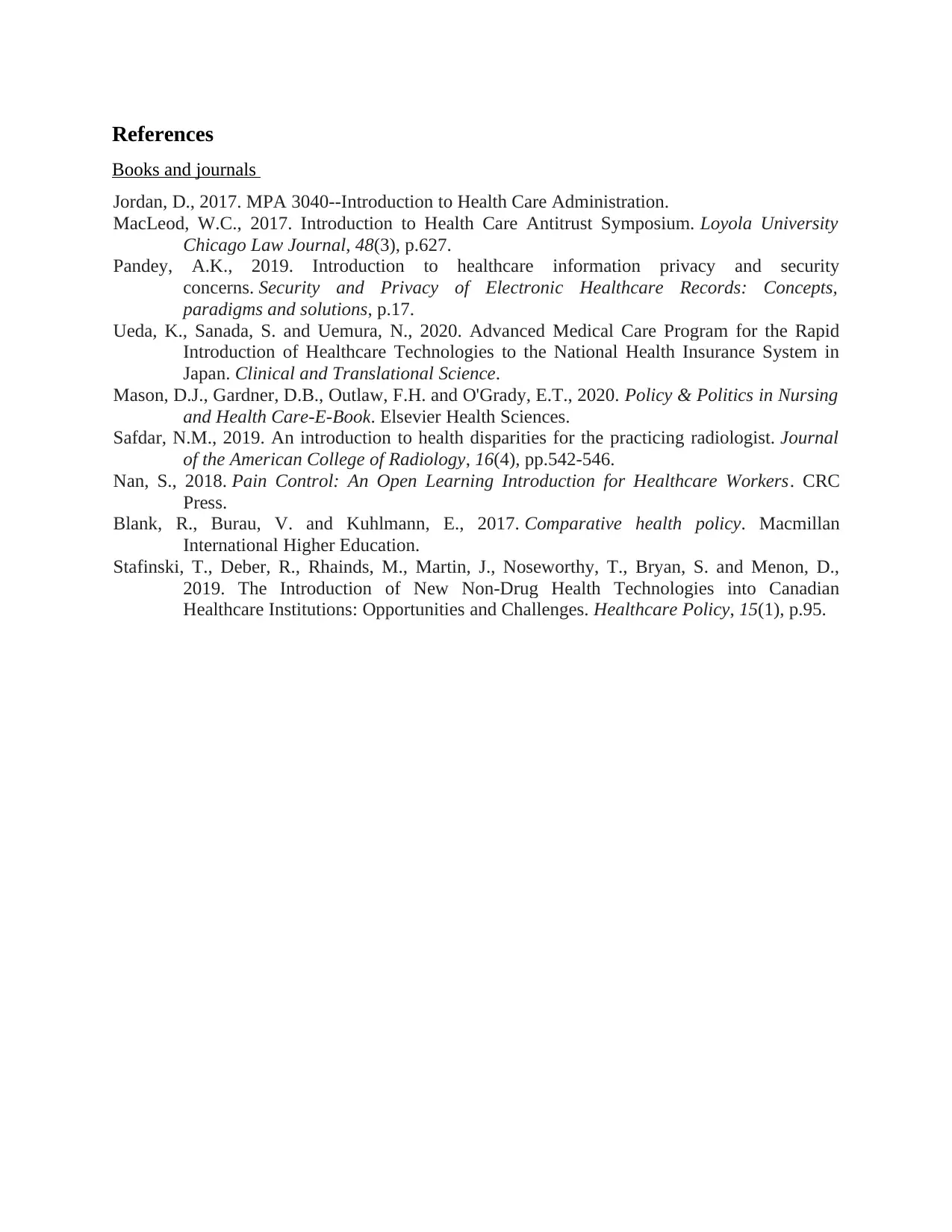
References
Books and journals
Jordan, D., 2017. MPA 3040--Introduction to Health Care Administration.
MacLeod, W.C., 2017. Introduction to Health Care Antitrust Symposium. Loyola University
Chicago Law Journal, 48(3), p.627.
Pandey, A.K., 2019. Introduction to healthcare information privacy and security
concerns. Security and Privacy of Electronic Healthcare Records: Concepts,
paradigms and solutions, p.17.
Ueda, K., Sanada, S. and Uemura, N., 2020. Advanced Medical Care Program for the Rapid
Introduction of Healthcare Technologies to the National Health Insurance System in
Japan. Clinical and Translational Science.
Mason, D.J., Gardner, D.B., Outlaw, F.H. and O'Grady, E.T., 2020. Policy & Politics in Nursing
and Health Care-E-Book. Elsevier Health Sciences.
Safdar, N.M., 2019. An introduction to health disparities for the practicing radiologist. Journal
of the American College of Radiology, 16(4), pp.542-546.
Nan, S., 2018. Pain Control: An Open Learning Introduction for Healthcare Workers. CRC
Press.
Blank, R., Burau, V. and Kuhlmann, E., 2017. Comparative health policy. Macmillan
International Higher Education.
Stafinski, T., Deber, R., Rhainds, M., Martin, J., Noseworthy, T., Bryan, S. and Menon, D.,
2019. The Introduction of New Non-Drug Health Technologies into Canadian
Healthcare Institutions: Opportunities and Challenges. Healthcare Policy, 15(1), p.95.
Books and journals
Jordan, D., 2017. MPA 3040--Introduction to Health Care Administration.
MacLeod, W.C., 2017. Introduction to Health Care Antitrust Symposium. Loyola University
Chicago Law Journal, 48(3), p.627.
Pandey, A.K., 2019. Introduction to healthcare information privacy and security
concerns. Security and Privacy of Electronic Healthcare Records: Concepts,
paradigms and solutions, p.17.
Ueda, K., Sanada, S. and Uemura, N., 2020. Advanced Medical Care Program for the Rapid
Introduction of Healthcare Technologies to the National Health Insurance System in
Japan. Clinical and Translational Science.
Mason, D.J., Gardner, D.B., Outlaw, F.H. and O'Grady, E.T., 2020. Policy & Politics in Nursing
and Health Care-E-Book. Elsevier Health Sciences.
Safdar, N.M., 2019. An introduction to health disparities for the practicing radiologist. Journal
of the American College of Radiology, 16(4), pp.542-546.
Nan, S., 2018. Pain Control: An Open Learning Introduction for Healthcare Workers. CRC
Press.
Blank, R., Burau, V. and Kuhlmann, E., 2017. Comparative health policy. Macmillan
International Higher Education.
Stafinski, T., Deber, R., Rhainds, M., Martin, J., Noseworthy, T., Bryan, S. and Menon, D.,
2019. The Introduction of New Non-Drug Health Technologies into Canadian
Healthcare Institutions: Opportunities and Challenges. Healthcare Policy, 15(1), p.95.
⊘ This is a preview!⊘
Do you want full access?
Subscribe today to unlock all pages.

Trusted by 1+ million students worldwide
1 out of 9
Related Documents
Your All-in-One AI-Powered Toolkit for Academic Success.
+13062052269
info@desklib.com
Available 24*7 on WhatsApp / Email
![[object Object]](/_next/static/media/star-bottom.7253800d.svg)
Unlock your academic potential
Copyright © 2020–2026 A2Z Services. All Rights Reserved. Developed and managed by ZUCOL.





